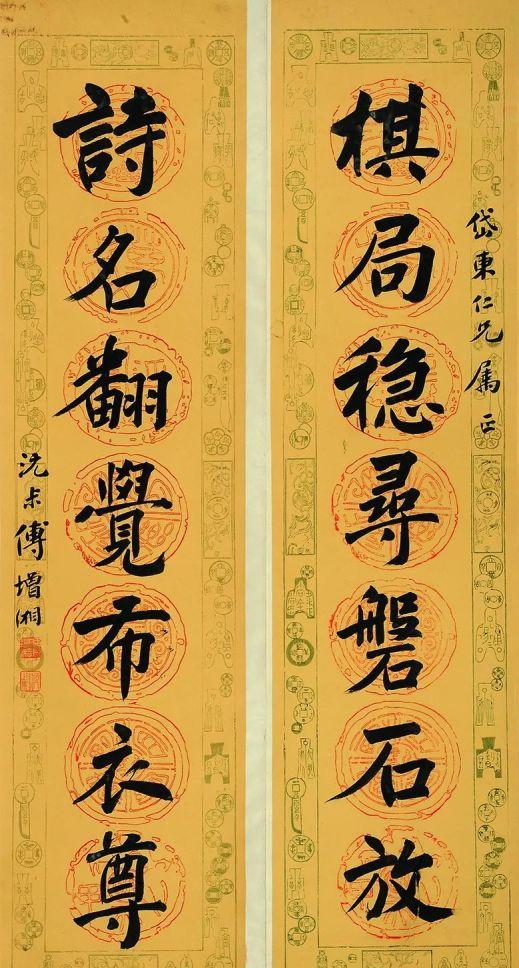
Mr. Fu Zengxiang's calligraphy is mainly based on calligraphy and calligraphy, taking the Fa Gaogu, the calligraphy is also taken from famous artists such as Ouyang Qing and Liu Gongquan, and in his later years, he also learned the calligraphy of Wei Bei, and the handwriting was dignified and elegant. This folio couplet reads: "The chess game is firmly on the rock, and the poem is translated into the cloth of cloth." It is written with a tile pattern decorated with yellow wax letters, with a dignified font and an elegant style. The upper paragraph has "Dai Dong Ren Brother Belongs to Zheng", the lower paragraph has "Yuanga Fu Zengxiang", and the plutonium has "Fu Zengxiang" White Wenyin and "Yuanga" Zhu Wenyin. Looking at this couplet can not only be limited to his calligraphic art style, but more importantly, to understand his cultural background, you can try to find some appreciation materials in the content of his couplet, such as "chess game", "rock", "poetry", "cloth" and other terms to express the meaning.
Fu Zengxiang (1872-1950) Ziyuan Shu, Nozoyuan, Sichuan Jiang'an people. Born in the Shuxiang family, he and his two elder brothers Zenglian and Zengli were both admitted to the Jinshi, and had the reputation of "one discipline and three jinshi and two Hanlin". Fu, who was the education director of the Beiyang government, urged Xu Beihong and other young talents to study abroad, but resigned in anger because of his opposition to the suppression of students and the refusal to depose Cai Yuanpei, the president of Peking University. In the twenty-fourth year of Guangxu (1898), Jinshi entered the Hanlin Academy in 1898 as a Shujishi. In 1905, he founded China's first girls' school: Tianjin Girls' Public School, and in 1907, he founded Tianjin Beiyang Women's Normal School (now Tianjin Academy of Fine Arts). The first person in China's history to open women's education. In 1917, he was appointed Chief of Education of the Beiyang Government and Chairman of the Beijing Financial Consolidation Committee. He was dismissed during the May Fourth Movement for resisting the Beiyang government's order to remove Cai Yuanpei and opposing the suppression of students. Since then, he has devoted himself to the study of collectible books and edition bibliography. In 1927, he served as the director of the library of the Palace Museum, the vice president of the Oriental Culture Agreement, the chairman of Beijing Fu Jen University (now Beijing Normal University) and many other cultural, school, commercial, charity, public welfare and other social organizations, such as the president, director and member.